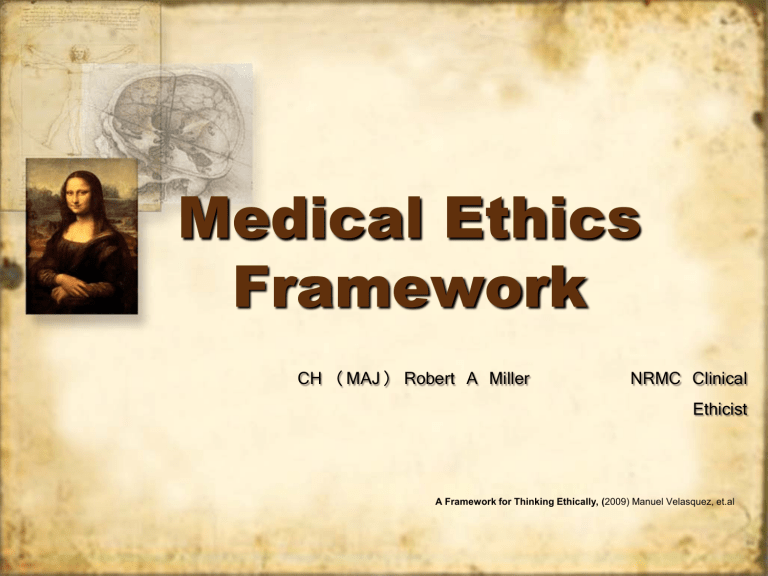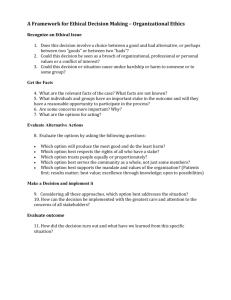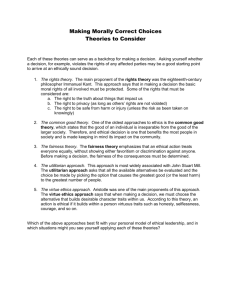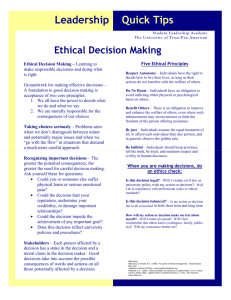Medical Ethics Framework - Health Sciences Diversity

Medical Ethics
Framework
CH (MAJ) Robert A Miller NRMC Clinical
Ethicist
A Framework for Thinking Ethically, ( 2009) Manuel Velasquez, et.al
Objectives
1. Review central philosophies reflected in medical ethics.
2. Reflect on the formulation of a matrix of ethical decision making.
3. Formulate, and present particular application of an ethical decision making process.
WHAT ARE MEDICAL ETHICS?
• Not the same as Feelings
• Not Religion
• Not just following the Law
• Not just following culturally accepted Norms
• Not science
Identifying Ethical Standards
Can be Hard
1.
On what do we base our ethical standards?
2.
How do those standards get applied to specific situations we face?
Five Sources of Ethical Standards
• The Utilitarian Approach
• The Rights Approach
• The Fairness or Justice Approach
• The Common Good Approach
• The Virtue Approach
The Utilitarian Approach
Emphasizes those actions that provide the most good or does the least amount of harm,
The Rights Approach
Emphasize those actions that best protect and respect the moral rights of those affected
The Fairness or Justice Approach
Emphasizes those actions that treat all human beings equally-or if unequally, then fairly based on some standard that is defensible.
The Common Good Approach
Emphasizes the interlocking relationships of society as the basis of ethical reasoning and that respect and compassion for all others-especially the vulnerableare requirements of such reasoning.
The Virtue Approach
Emphasizes that actions ought to be consistent with certain ideal virtues that provide for the full development of our humanity
Synergy or Entropy
• We may not agree on the content of some of these specific approaches.
• We may not all agree to the same set of human and civil rights.
• We may not agree on what constitutes the common good.
• We may not even agree on what is a good and what is a harm.
A Framewor k for Ethical
Decision Making
• Recognize an Ethical Issue
• Get the Facts
• Evaluate Alternative Actions
• Make a Decision and Test It
• Act and Reflect on the Outcome
Recognize an Ethical Issue
• Could this decision or situation be damaging to someone or to some group?
• Does this decision involve a choice between a good and bad alternative, or perhaps between two
"goods" or between two "bads"?
• Is this issue about more than what is legal or what is most efficient? If so, how?
Get the Facts
• What are the relevant facts of the case?
• What individuals and groups have an important stake in the outcome?
• What are the options for acting?
Evaluate Alternative Actions
• Which option will produce the most good and do the least harm?
• Which option best respects the rights of all who have a stake?
• Which option treats people equally or proportionately?
• Which option best serves the community as a whole, not just some members?
• Which option leads me to act as the sort of person I want to be?
Make a Decision and Test It
• Reach a Consensus
• Re-evaluate the Consensus
Act and Reflect on the Outcome
• How can this decision be implemented with the greatest care and attention to the concerns of all stakeholders?
• How did this decision turn out and what has been learned from this specific situation?






